六级听力技巧长对话与短文
2021年12月六级听力长对话原文
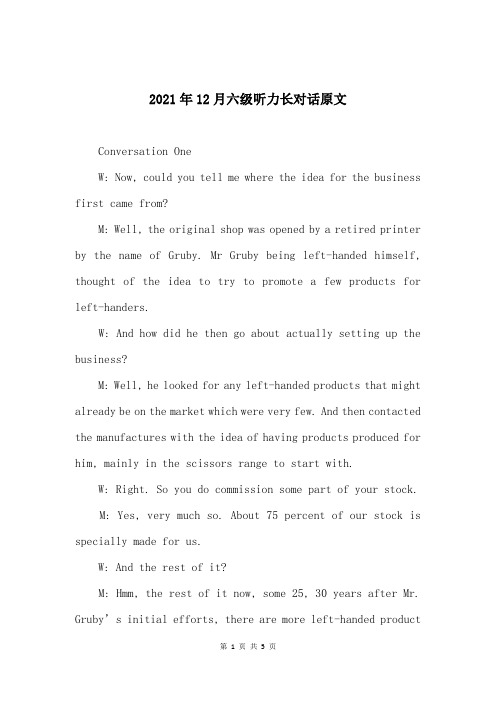
2021年12月六级听力长对话原文Conversation OneW: Now, could you tell me where the idea for the business first came from?M: Well, the original shop was opened by a retired printer by the name of Gruby. Mr Gruby being left-handed himself, thought of the idea to try to promote a few products for left-handers.W: And how did he then go about actually setting up the business?M: Well, he looked for any left-handed products that might already be on the market which were very few. And then contacted the manufactures with the idea of having products produced for him, mainly in the scissors range to start with.W: Right. So you do commission some part of your stock.M: Yes, very much so. About 75 percent of our stock is specially made for us.W: And the rest of it?M: Hmm, the rest of it now, some 25, 30 years after Mr. Gruby’s initial efforts, there are more left-handed productactually on the market. Manufactures are now beginning to see that there is a market for left-handed products.W: And what’s the range of your stock?M: The range consists of a variety of scissors from children scissors to scissors for tailors, hairdressers etc. We also have a large range of kitchen ware.W: What’s the competition like? Do you have quite a lot of competition?M: There are other people in the business now in specialists, but only as mail-order outlets. But we have a shop here in central London plus a mail-order outlet. And we are without any doubt the largest supplier of the left-handed items.这是一篇采访一名专为左撇子们提供产品的供应商的文章。
英语六级听力这么做,至少提分200+!

英语六级听力题型这么做能得高分!听力是英语六级考试中的重难点部分,也是大家丢分比较多的题型。
每种题型都有一定的总体答题技巧,只要大家掌握这些题型的答题技巧,英语六级听力题型就能快速过关。
一、英语六级听力改革题型了解六级听力取消了原来的短对话(长对话保持)和短文听写。
听力篇章从原先的3篇缩减为2篇。
新增讲座与讲话3篇,此题型与托福考试中的Lecture相似。
每篇Lecture,字数大约在350-450词左右。
四六级考试委员会在这次改革后给出的样题中,三篇讲座/讲话文章皆出自于托福试题。
大家可以看到,这次改革后六级考试的难度是有所增加的。
二、英语六级听力题型的难点所在篇幅方面:新增的Lecture部分,字数大约在350-450词左右,相较于短文部分(250词左右),篇幅上有了很大的提升,大家在听题的过程中,不容易抓住重点。
内容方面:英语六级题型所考话题也将不再是大家熟悉的校园类、生活类,而将转变为当前的社会与经济问题或是科技发展。
在托福考试中,讲座部分还经常会涉及到学科方面,因此整体的词汇表达对大家而言都相对陌生,难度系数大大增强。
针对这些听力变革后的难点,大家可以这么去复习备考这些题型。
三、英语六级听力题型技巧①词汇积累:除了原本六级听力高频词汇之外,大家还可以开始对于托福听力的高频词汇进行一定的积累和背诵。
原本的词汇学习,大家可以用真题学习,巨微英语《六级真题/逐句精解》就很不错,书中把阅读文章解析的很是详细,基础不好的人,很适合用它打基础。
对于托福听力高频词汇的积累,就要慢慢来了。
②掌握讲座/讲话的规律:通常,开篇会进行背景介绍以及话题引入;在正式的内容中,会从当前情况、面临问题、解决方法、未来展望等方面铺展开。
大家可以与审题相结合,提高对于文章的把握。
这种新题型大家还是要练习的,巨微英语送了听力改革新题型专训的小册子,建议大家多多练习,可以结合书中的听力满分兵法大总结学习听力做题技巧。
③英语六级听力题型长对话技巧:●视听基本一致加同义替换,长对话经常是听到什么就是什么,在选项里可能会拿同义词替换掉文中的词。
六级听力题型种类
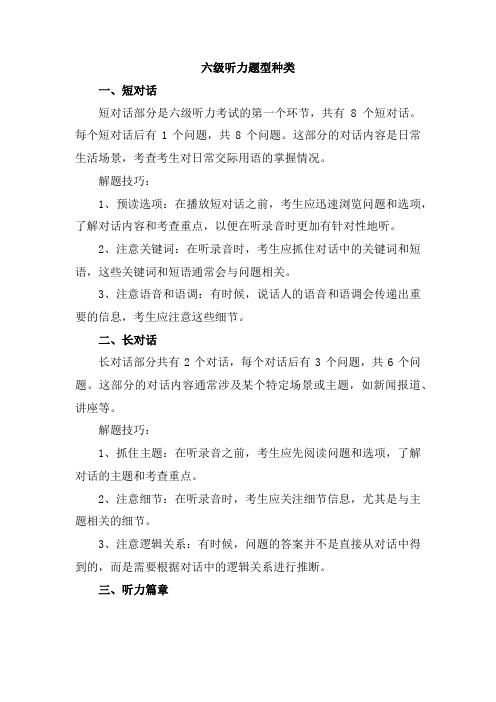
六级听力题型种类一、短对话短对话部分是六级听力考试的第一个环节,共有8个短对话。
每个短对话后有1个问题,共8个问题。
这部分的对话内容是日常生活场景,考查考生对日常交际用语的掌握情况。
解题技巧:1、预读选项:在播放短对话之前,考生应迅速浏览问题和选项,了解对话内容和考查重点,以便在听录音时更加有针对性地听。
2、注意关键词:在听录音时,考生应抓住对话中的关键词和短语,这些关键词和短语通常会与问题相关。
3、注意语音和语调:有时候,说话人的语音和语调会传递出重要的信息,考生应注意这些细节。
二、长对话长对话部分共有2个对话,每个对话后有3个问题,共6个问题。
这部分的对话内容通常涉及某个特定场景或主题,如新闻报道、讲座等。
解题技巧:1、抓住主题:在听录音之前,考生应先阅读问题和选项,了解对话的主题和考查重点。
2、注意细节:在听录音时,考生应关注细节信息,尤其是与主题相关的细节。
3、注意逻辑关系:有时候,问题的答案并不是直接从对话中得到的,而是需要根据对话中的逻辑关系进行推断。
三、听力篇章听力篇章部分共有3篇短文,每篇短文后有3个问题,共9个问题。
这部分的短文内容涉及社会、文化、科技等各个领域,难度较高。
解题技巧:1、阅读选项:在播放短文之前,考生应快速浏览问题和选项,了解短文的主题和考查重点。
2、注意关键词:在听录音时,考生应抓住文章中的关键词和短语,这些关键词和短语通常会与问题相关。
3、注意语调和语气:有时候,说话人的语调和语气会传递出重要的信息,考生应注意这些细节。
4、注意上下文:有时候,问题的答案需要在上下文中寻找线索,考生应注意文章中的逻辑关系和细节信息。
四、讲座/讲话讲座/讲话部分是一个较长的录音片段,通常是一位教授或专业人士就某个特定主题进行讲解或发表演讲。
这部分的录音内容通常较为正式和专业。
解题技巧:1、抓住主题:在听录音之前,考生应先阅读问题和选项,了解讲座/讲话的主题和考查重点。
2、注意细节:在听录音时,考生应关注细节信息,尤其是与主题相关的细节。
2019年六级听力原文第一套

2019年六级听力原文第一套一、开场白2019年六级听力考试是我国教育部于2019年12月21日举行的英语水平考试。
六级听力考试一般包括听力短对话和长对话,考察学生对于英语口语和听力的理解能力。
二、短对话1.女:What do you think of the new teacher?男:He’s great. He’s always ready to help you.2.男:Hey, have you decided to join the music club yet?女:No, not yet. I’m still thinking about it.3.男:Could you tell me how to get to the nearest post office?女:Sure, go str本人ght and turn left at the second crossing, you can see it on the right.4.女:John is not here today, do you know where he is?男:He has a meeting with the department head this morning.三、长对话1.女:I’m thinking of going on a diet. I’ve put on a lot of weight recently.男:I don’t think that’s necessa ry. You look good as youare.女:Thanks for saying that, but I’m going to do it anyway.2.男:Do you know when the library is open?女:I think it’s open from 8 in the morning to 10 at night, but you’d better check their website for the exact ti me.男:Thanks, I’ll do that.四、总结2019年六级听力原文第一套中的短对话和长对话内容涵盖了日常生活中常见的场景,考察考生对于基本口语和日常情景的理解和表达能力。
听力长对话与短文解析与答题技巧
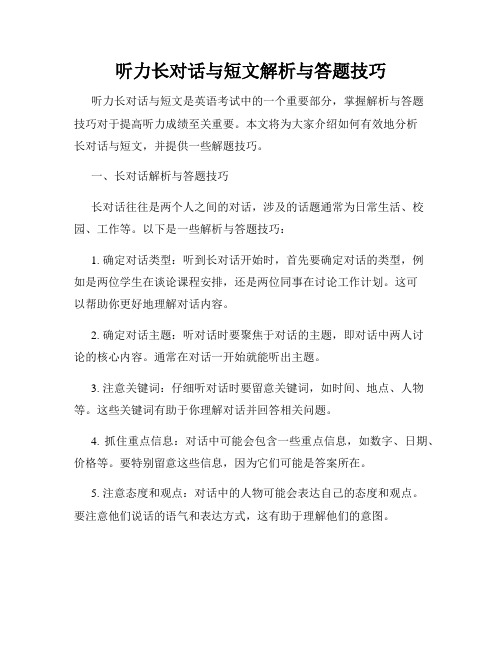
听力长对话与短文解析与答题技巧听力长对话与短文是英语考试中的一个重要部分,掌握解析与答题技巧对于提高听力成绩至关重要。
本文将为大家介绍如何有效地分析长对话与短文,并提供一些解题技巧。
一、长对话解析与答题技巧长对话往往是两个人之间的对话,涉及的话题通常为日常生活、校园、工作等。
以下是一些解析与答题技巧:1. 确定对话类型:听到长对话开始时,首先要确定对话的类型,例如是两位学生在谈论课程安排,还是两位同事在讨论工作计划。
这可以帮助你更好地理解对话内容。
2. 确定对话主题:听对话时要聚焦于对话的主题,即对话中两人讨论的核心内容。
通常在对话一开始就能听出主题。
3. 注意关键词:仔细听对话时要留意关键词,如时间、地点、人物等。
这些关键词有助于你理解对话并回答相关问题。
4. 抓住重点信息:对话中可能会包含一些重点信息,如数字、日期、价格等。
要特别留意这些信息,因为它们可能是答案所在。
5. 注意态度和观点:对话中的人物可能会表达自己的态度和观点。
要注意他们说话的语气和表达方式,这有助于理解他们的意图。
6. 多练习听力材料:多做听力练习是提高听力能力的有效途径。
可以选择一些真实的听力材料进行练习,以熟悉不同类型的对话和提高听力反应速度。
二、短文解析与答题技巧短文一般为一段话或者几段话的篇幅,涉及的话题范围更广,通常包括新闻、广告、公告等。
以下是一些解析与答题技巧:1. 浏览全文:在听短文之前,先快速浏览全文,了解短文的大致内容和主题,这可以帮助你更好地理解短文细节。
2. 注意开头和结尾:短文的开头和结尾通常会提到主题或者重要信息,要特别留意这些部分。
3. 注意时间和顺序:短文中可能会提及时间顺序或者事件的发生顺序,要注意抓住这些信息,以便更好地理解短文。
4. 注意关键词:和长对话一样,关键词在短文中同样重要。
要留意领域特定的词汇,如数字、名称、地点等。
5. 分清事实和观点:短文中的信息可能包括事实和观点两种。
要学会区分二者,以便准确回答相关问题。
英语六级听力新题型模拟听写训练-第12套长对话(1)
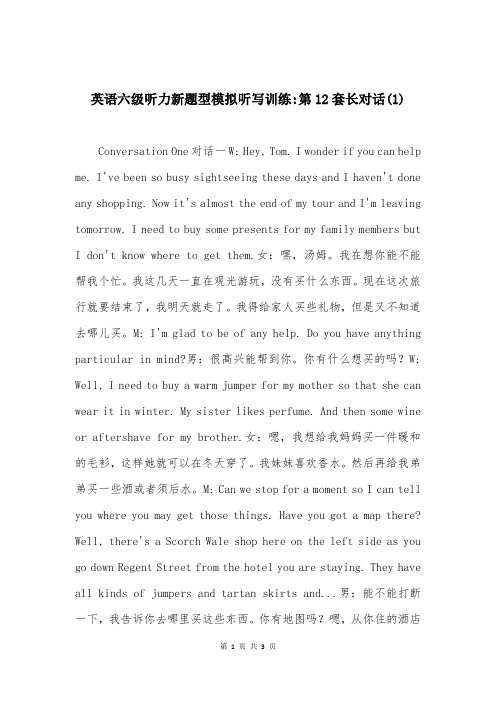
英语六级听力新题型模拟听写训练:第12套长对话(1)Conversation One对话一W: Hey, Tom. I wonder if you can help me. I've been so busy sightseeing these days and I haven't done any shopping. Now it's almost the end of my tour and I'm leaving tomorrow. I need to buy some presents for my family members but I don't know where to get them.女:嘿,汤姆。
我在想你能不能帮我个忙。
我这几天一直在观光游玩,没有买什么东西。
现在这次旅行就要结束了,我明天就走了。
我得给家人买些礼物,但是又不知道去哪儿买。
M: I'm glad to be of any help. Do you have anything particular in mind?男:很高兴能帮到你。
你有什么想买的吗?W: Well, I need to buy a warm jumper for my mother so that she can wear it in winter. My sister likes perfume. And then some wine or aftershave for my brother.女:嗯,我想给我妈妈买一件暖和的毛衫,这样她就可以在冬天穿了。
我妹妹喜欢香水。
然后再给我弟弟买一些酒或者须后水。
M: Can we stop for a moment so I can tell you where you may get those things. Have you got a map there? Well, there's a Scorch Wale shop here on the left side as you go down Regent Street from the hotel you are staying. They have all kinds of jumpers and tartan skirts and...男:能不能打断一下,我告诉你去哪里买这些东西。
英语六级听力答题技巧讲解

英语六级听力答题技巧汇总新题型六级的重点是听力理解方面的测试,听力分值由原来的20%提高到35%。
按照新教学大纲的要求,学生在修完基础阶段6级后应具有一定的听的能力,对题材熟悉、难度略浅于精读课文、基本上无生词、语速为每分钟150词的听力材料,一遍可以听懂,理解的准确率不低于70%。
一.短对话常考情景:话题与生活相关,涉及校园,生活,工作及各种社交场所。
如校园生活情景涉及入学,认识新同学,借书,师生交流,作业,论文,对课程的评价、考试、补课,业余活动等。
家庭生活情景涉及饮食、娱乐、旅行,交通,卫生医疗,居家琐事,在家请客,住房搬家,购物等。
工作场景涉及到学生兼职,招聘面试、工作选择,工作状态、同事相处,工作目标等。
常见题型:地点场景题(通常会提供某些地点和场景的标志性词汇,需要根据关键词进行推断),身份关系题(猜测人物关系,通常不提供明确信息),数字信息题(主要有两种考法:一种是对话中出现多种数字,需要考生辨别哪个是正确答案,一种是需要明确各个数量之间的关系,进行简单的计算)。
请求建议题(通常请求或建议由第二个speaker 提出),观点态度题(考查对话一方的态度、立场、观点、评价等,可以通过对句子的理解和语调的把握进行推断)。
谈话主旨题、细节辨认题等。
二.长对话长对话的谈话双方会就某一个话题进行多个回合的交流,信息量更多,人物态度、语气、情感变化更复杂。
提问的方式与短对话相同,考生应在答题前快速浏览选项,大致推测对话发生的情景。
听时做好笔记,记录对话中的数字、人名、地名,表示观点的标示词,重复率高的词或词组,表示因果、转折、比较及其他重要标示词。
三.短文理解题材涉及英美国家的社会、教育、文化、体育、科学、技术、风俗、人情、历史、地理等方面。
常考题型有三种:主旨大意题:要重视首尾句、同时要重视短文多次提到的某些词语或内容。
事实细节题:短文中的主要人物、人名、时间、主要时间、数据、原因等细节需做笔记,另外关注标示逻辑关系的句子如转折、因果、条件等。
2023英语四级六级听力长对话技巧

2023英语四级六级听力长对话技巧英语四级六级听力长对话技巧1四级听力中长对话采用两人对话的形式,就日常生活展开对话。
对话有两段,每段为5~8轮对话和3~4个问题,每段约为200~300单词。
涉及的内容深入,有一个“中心议题”,对话双方都是围绕中心而展开话题。
每段对话朗读一遍,每个问题后留有15秒的答题时间。
按题材分类,长对话主要有社会生活类、人物故事及历史类、科普知识类和文化教育类。
按照题型分类,长对话主要有细节题和推理判断题。
长对话大部分都是细节题,命题点常常是对话中所谈论的某个时间、地点、原因、事件等。
当然,题目的正确选项与对话内容中的某些字词完全相同的还是属于少数,细节题主要以答案是对话细节的同义转述为主。
正确选项不再是对话中某个细节的再现,而是换了一种形式来表达,它们是对话中某个细节的同义转述。
因此考生即使听到了对话中的某个细节,还得注意它的“其他表达方式,比如近义转换、句型转换等。
推理题在长对话中所占比例较小,每一套题中可能涉及两、三题。
推理题是相对较难的一种题型,需要考生对某个细节有深层次的理解。
由于推理不是凭空进行,而是建立在细节的基础上的合乎逻辑的推断,因此考生有必要捕捉对话的细节,找到与需要推理的相关部分,及时做笔记,还要综合问题加以分析,这样才能选出正确的答案来。
英语四级六级听力长对话技巧扩展阅读英语四级六级听力长对话技巧(扩展1)——英语四级听力长对话的技巧英语四级听力长对话的技巧1听前预测对于听力长对话非常重要。
放音间隔的时间应尽可能留作预测之用。
若想有效使用这短短几十秒的放音间隔时间,需把握以下两个原则:1. 分清主次与生活中的情形相似,双方对话的时候常有主次之分,如:一方询问,另一方作答时,关键信息多出现在作答一方,考点自然也就多出于此。
分清对话双方的主次对于我们预测考点出现的位置很重要,方法也简单易行。
例:22. A) It was about a little animal.B) It took her six years to write.C) It was adapted from a fairy tale.D) It was about a little girl and her pet.23. A) She knows how to write best-selling novels.B) She can earn a lot of money by writing for adults.C) She is able to win enough support from publishers.D) She can make a living by doing what she likes.24. A) The characters. B) The readers.C) Her ideas. D) Her life experiences.25. A) She doesn"t really know where they originated.B) She mainly drew on stories of ancient saints.C) They popped out of her child-hood dreams.D) They grew out of her long hours of thinking.通看下划线部分不难发现,几乎所有的选项都与女性会话者有关,可料想此对话中男性会话者多提出问题,女性多做答复,听时当然主要听女性会话者所说的内容。
2021年12月英语六级(第1套)听力真题 长对话(2)
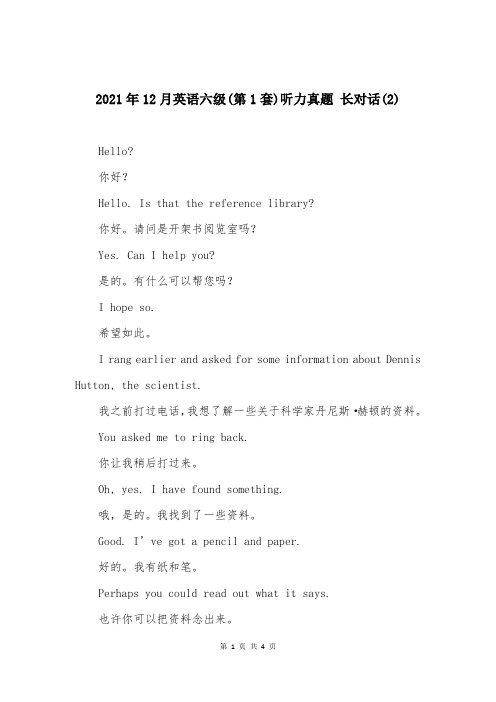
2021年12月英语六级(第1套)听力真题长对话(2)Hello?你好?Hello. Is that the reference library?你好。
请问是开架书阅览室吗?Yes. Can I help you?是的。
有什么可以帮您吗?I hope so.希望如此。
I rang earlier and asked for some information about Dennis Hutton, the scientist.我之前打过电话,我想了解一些关于科学家丹尼斯·赫顿的资料。
You asked me to ring back.你让我稍后打过来。
Oh, yes. I have found something.哦,是的。
我找到了一些资料。
Good. I’ve got a pencil and paper.好的。
我有纸和笔。
Perhaps you could read out what it says.也许你可以把资料念出来。
Certainly. Hutton Dennis, born Darlington, 1836, died New York, 1920.当然可以。
赫顿·丹尼斯,1836年生于达灵顿,1920年死于纽约。
Yes, got that.好的,记下来了。
Inventor and physicist, the son of a farm worker.发明家、物理学家,父亲在农场工作。
He was admitted to the University of London at the age of 15.十五岁时被伦敦大学录取。
Yes.好的。
He graduated at 17 with the first class degree in physics and mathematics.17岁以物理和数学一等学位头衔毕业。
All right?好了吗?Yes, all right.恩,好了。
六级听力技巧

九、若选项中出现两个意思相反的选项,答案肯定从这两个中间出;若选项中有两个形式相似的选项,答案也从这两个中不到,原因一定是书还没还(In circulation);
2.自己的书还晚了,过期则要罚钱(fine);
3.借书场景常出现的词汇:Check out(借书),take out(借书),overdue(过期)。
The training is divided into stages.
一、卷子发下来后快速的浏览一遍,包括题干和答案。这样会大大提高你对听力的理解——知道它是讲什么内容,大概是怎么回事。这个时候不要去写考号什么的。尽管留到交卷时写好了。
二、没听懂的题目,就放弃它,千万不要听下道题的时候还在想上道题。如果引起连锁反应那你的复习就白费了。
短对话题:一次问与答,往往第二个说话人的话更重要,包含出题内容。要注意听说话人一开始的几个词,即越是靠前出现的信息越重要。也就是改掉听力时候总是期待和听句子靠后部分的信息,靠后的信息有可能是干扰项。
二、长对话:看题比听更重要,一定要留够足够的时间看完一篇对话的所有选项。边听边做,题目的设置为顺序原则。第一题往往问总的情况,如对话发生的场合,接下来的几道题都是细节题,按顺序听到什么选什么。
七、唱反调原则是六级听力考试中最重要的一个原则!再加上女尊男卑这一第二重要原则,这一类题是最好做的,常常是只要听清楚问题,答案就直接出来了。
例如:男生叫女生出去玩,女生绝对是表达“I'd love to,but…”的意思,且原因常常是因为女生要学习(注意:六级听力中,女生的学习永远比男生好)。
唱反调原则的重要延伸:1.一般疑问句的答案一般是否定;
2.反问句表否定,如:Are you kidding?或Really?一定是表达否定意思;
英语六级听力原文

心之所向,所向披靡【短对话】1.W: What a wonderful performance! Your rock band has never sounded better.M: Many thanks. I guess all those hours of practice in the past month are finally paying off.Q:What does the man mean?2.M: I can't decide what to do for my summer vacation. I either want to go on a bike tour of Europe or go diving in Mexico.W: Well, we're offering an all-inclusive two-week trip to Mexico for only 300 dollars.Q:What does the woman suggest the man do for his vacation?3. W: How long do you think this project might take?M: I'd say about three months, but it could take longer if something unexpected happened. Maybe we'd better allow an extra month, so we won’t have to worry about being late. Q: Why does the man say extra time should be allowed for the project?4. M: I'm thinking about becoming a member here, and I'd like some information.W: Sure. A three-month membership costs 150 dollars, and that includes use of the wait-room, sauna and pool. I'll give you a free path so that you can try out the facilities before you decide.Q: What do we learn from the conversation?5.W: I'm sorry to hear that you failed the Physics course, Ted. M: Let's face it. I'm just not cut out to be a scientist.Q: What does the man mean?6.M: Gary insisted on buying the food for the picnic.W: That's pretty generous of him. But shouldn't we at least offer to share the expenses? He has a big family to support. Q: What does the woman suggest they do?7.W: Did you see the headlines in the paper this morning? M: Year. Apparently the bus company will be laying off its employees if they can't reach an agreement on wages by midnight.Q: What did the man read about?8.W: Have we received payment for the overseas order we delivered last month?M: Yes. The cheque came in yesterday afternoon. I'll be depositing it when I go the bank today.Q: What is the woman concerned about?【六级听力长对话原文1】W: OK, that's it. Now we have to make a decision. We might as well do that now, don't you think?M: Sure, let's see. First we saw Frank Brisenski. What did you think of him?W: Well, he's certainly a very polite young man.M: And very relaxed, too.W: But his appearance…M: En… He wasn't well dressed. He wasn't even wearing a tie.W: But he did have a nice voice. He sounded good on the telephone.M: True. And I thought he seemed very intelligent. He answered Dona's questions very well.W: That's true, but dressing well is important. Well, let's think about the others. Now what about Barbara Jones? Shehad a nice voice, too. She sounded good on the telephone, and she was well dressed, too.M: En… She did look very neat, very nicely dressed, but…W: But so shy. She wouldn't be very good at talking to people at the front desk.M: En…OK. Now who was the next? Ar…Yes, David Wallace.I thought he was very good, had a lot of potential. What do you think?W: En… He seemed like a very bright guy. He dressed very nicely, too. And he had a really nice appearance.M: He seemed relaxed to me, the type of person people feel comfortable with right away.W: He was polite, but also very friendly and relaxed as you say. I think he'll be good with the guests at the front desk. M: He had a very pleasant voice, too.W: That's right. OK, good! I guess we have our receptionist then, don't you?M: Yes, I think so. We'll just offer the job to…Question 9: What are the speakers looking for?Question 10: What is Frank Brisenski's weakness? Question 11: What do the speakers decide to do?【六级听力长对话原文2】W: Hello.M: Hello. Is that the reference library?W: Yes, can I help you?M: I hope so. I ran earlier and asked for some information about Dennis Hutton, the scientist. You asked me to ring back.W: Oh, yes. I have found something.M: Good. I've got a pencil and paper. Perhaps you could read out what it says.W: Certainly. Hutton Dennis, born Darlington, 1836, died New York, 1920.M: Yes, got that.W: Inventer and physicist, the son of a farmworker. He was admitted to the University of London at the age of 15. M: Yes.W: He graduated at 17 with the first class degree in physics and mathematics. All right?M: Yes, all right.W: He made his first notable achievement at the age of 18. It was a method of refrigeration which rolls from his work in low temperature physics. He became professor of mathematics at the University of Manchester at 24, wherehe remained for twelve years. During that time, he married one of his students, Natasha WilloughbyM: Yes, go on.W: Later working together in London, they laid the foundations of modern physics by showing that normal laws of cause and effect do not apply at the level of subatomic particles. For this he and his wife received the Nobel Prize for physics in 1910, and did so again in 1912 for their work on very high frequency radio waves. In his lifetime, Hutton patented 244 inventions. Do you want any more?M: Yes, when did he go to America?W: Let me see. In 1920 he went to teach in New York and died there suddenly after only three weeks. Still he was a good age.M: Yes, I suppose so. Well, thanks.Question 12: What do we learn about Dennis Hutton when he was 15?Question 13: What did Dennis Hutton do at the age of 24? Question 14: For what were Dennis Hutton and his wife awarded the Nobel Prize a second time?Question 15: Why did Dennis Hutton go to New York?六级短文1原文In America, white tailed deer are more numerous than ever before, so abundant in fact that they've become a suburban nuisance and a health hazard.Why can't the herd be thinned the old-fashioned way? The small community of North Haven on Long Island is home to some six hundred to seven hundred deer. The department of Environmental Conservation estimates the optimum population at 60. The town has been browsed bare of vegetation except where gardens and shrubs are protected by high fences.Drivers routinely collide with deer and there are so many dead bodies left by the side of the road that the town has made it a deal with a local pet cemetery to collect and dispose of the bodies. Some people in the town have become ill from deer transmitted diseases. On the occasions when hunting has been tried, local animal rights people have worked to secure court orders against the hunts. And when that is failed, they stop the hunters, banging on pots and pans to alert the deer. Town meetings called to discuss the problem inevitably dissolved into confrontations.The activists believe simply that the deer are not the problem. Some communities have even discussed thepossibility of bringing wolves back into the ecological mix. That means wolves in the suburbs of New York. It is almost too wonderful not to try it. The wolves would kill deer of course. They would also terrorize and kill dogs and cats which is not what the suburban dwellers have in mind. Questions 16 to 18 are based on the passage you have just heardQ16. What do we learn about white-tailed deer in North Haven?Q17. Why do local animal rights people bang on pots and pans?Q18. What would happen if wolves were brought back into the ecological mix?六级短文2原文And now, if you'll walk this way, ladies and gentlemen, the next room we're going to see is the room in which the family used to hold their formal dinner parties and even occasionally entertain heads of state and royalty. However, they managed to keep this room friendly and intimate. And I think you'll agree. It has a very informal atmosphere, quite unlike some grand houses you visit. The curtains were never drawn, even at night, so guests got a view of the lakeand fountains outside which were lit up at night – a very attractive sight. As you can see, ladies and gentlemen, the guests were seated very informally around this oval table, which would add to the relaxed atmosphere. The table dates from the 18th century and is made from Spanish oak. It's rather remarkable for the fact that although it's extremely big, it's supported by just six rather slim legs. However, it seems to have survived like that for 200 years. So it's probably going to last a bit longer. The chairs which go with the table are not a complete set. There were originally six of them. They are interesting for the fact that they are very plain and undecorated for the time, with only one plain central panel at the back and no armrests. I myself find them rather uncomfortable to sit in for very long, but people were used to more discomfort in the past. And now, ladies a nd gentlemen, if you'd like to follow me into the great hall…Q19. What do we learn about the speaker?Q20. What does the speaker say about the room they are visiting?Q21. What is said about the oval table in the room?Q22. What does the speaker say about the chairs?六级短文3原文Janet James was 22 years old when she was diagnosed with MS—a disease that attacks the body's nerves. She has just graduated from college and got a job at an advertising agency when she began to sense that something strange was going on inside her body.When James realized how severe her illness was, she knew she had better hurry up and live life. MS is the biggest cripplerof young adults. And although she didn't have many symptoms, she knew it was just a matter of time. First on her agenda was to pursue her dream of hosting a pop music programme. She worked at a radio station for a year, always aware that her body was degenerating. Then her best friend moved away. And one night James began screaming, "I got to go! I got to go!" Two weeks later, she arrived at Alaska, thousands of miles from her friends, her family and her past. "Everything fell into a place", she recalls. A 23-year-old girl with an incurable disease can fly to Alaska and everything can work out. The MS attacks came and went. And most of the time they hardly slowed her down. James hiked, fished, learnt to sail and experimented with hot air ballooning. "I lived for adventure", she says. "Nobody ever had a better time or did more exotic strange things than I did in an 80-year period."Inevitably however, the day came when she was so weakened that she had to return to Pittsburgh, her home town. There she began relieving her adventures by writing a book about them. Her book was published in 1993. Questions 23 to 25 are based on the passage you have just heard.Questions 23What does the speaker say about MS?Questions 24What did Janet James decide to do after her disease was diagnosed?Questions 25What's sort of person can we infer Janet James is?the ecological mix?听力填空原文It’s difficult to estimate the number of youngsters involved in home schooling where children are not sent to school and receive their formal education from one or both parents. Legislation and court decisions have made it legally possible in most states for parents to educate their children at home and each year more people take advantage of that opportunity.Some states require parents or a home tutor to meet teacher certification standards, and many require parents to complete legal forms to verify that their children are receiving instruction in state approved curriculum. Supporters of home education claim that it is less expensive and far more efficient than mass public education. Moreover they site several advantages: alleviation of school overcrowding, strengthen family relationships, lower dropout rates, the facts that students are allowed to learn at their own rate, increased motivation, higher standardized test scores, and reduced discipline problems.Critics of the home schooling movement content that it creates as many problems as it solves. They acknowledge that, in a few cases, home schooling offers educational opportunities superior to those found in most public schools, but few parents can provide such educational advantages. Some parents who withdraw their children from the schools in favor of home schooling have an inadequate educational background and insufficient formal training to provide a satisfactory education for their children. Typically, parents have fewer technological resources at their disposal than do schools. However, the relatively inexpensive computertechnology that is readily available today is causing some to challenge the notion that home schooling is in any way inferior to more highly structured classroom education.评论,观念,各有不同做好自己那份就好。
2021年12月英语六级(第2套)听力真题 长对话(1)
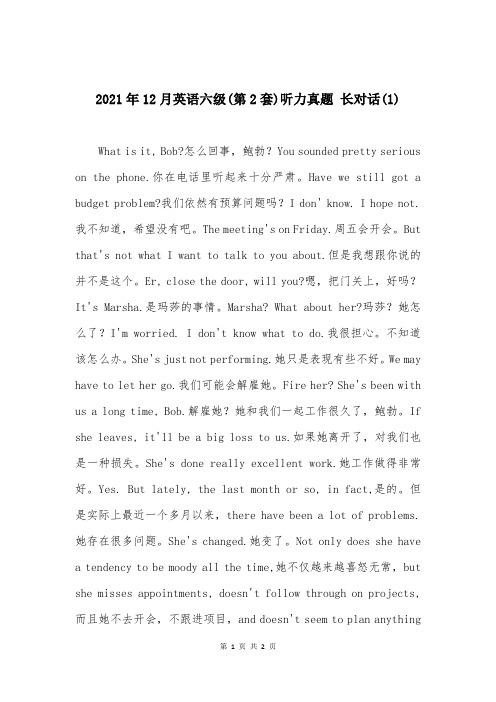
2021年12月英语六级(第2套)听力真题长对话(1)What is it, Bob?怎么回事,鲍勃?You sounded pretty serious on the phone.你在电话里听起来十分严肃。
Have we still got a budget problem?我们依然有预算问题吗?I don' know. I hope not.我不知道,希望没有吧。
The meeting's on Friday.周五会开会。
But that's not what I want to talk to you about.但是我想跟你说的并不是这个。
Er, close the door, will you?嗯,把门关上,好吗?It's Marsha.是玛莎的事情。
Marsha? What about her?玛莎?她怎么了?I'm worried. I don't know what to do.我很担心。
不知道该怎么办。
She's just not performing.她只是表现有些不好。
We may have to let her go.我们可能会解雇她。
Fire her? She's been with us a long time, Bob.解雇她?她和我们一起工作很久了,鲍勃。
If she leaves, it'll be a big loss to us.如果她离开了,对我们也是一种损失。
She's done really excellent work.她工作做得非常好。
Yes. But lately, the last month or so, in fact,是的。
但是实际上最近一个多月以来,there have been a lot of problems.她存在很多问题。
She's changed.她变了。
六级的听力部分有哪些常见题型

六级的听力部分有哪些常见题型六级考试是大家在大学期间备战的英语考试之一,听力部分是其中的重要组成部分。
了解六级听力部分的常见题型,对于提高听力能力和备考效果有着至关重要的作用。
本文将介绍六级听力部分的几种常见题型,以帮助大家更好地应对考试。
一、听力题型概述六级听力部分主要考察考生对于英语听力材料的理解能力和反应速度,题型多样。
一般来说,六级听力部分的题型包括:听力短对话、听力长对话、听力短文理解和听力长篇演讲。
下面将分别介绍这几种常见题型及解题技巧。
二、听力短对话题型听力短对话题型是六级听力中较为简单的一种题型。
一般由两个人进行对话,对白时间较短,内容通常涉及日常生活中的一些场景。
考生需要根据听力材料内容进行问题回答或填空。
解题技巧包括:提前预测答案,注意听关键词,抓住对话中的重要信息。
三、听力长对话题型听力长对话题型是六级听力中较为复杂的一种题型。
一般由两人或三人进行对话,对白时间相对较长,通常会涉及到一些学术或社会话题。
考生需要根据听力材料内容进行问题回答或填空。
解题技巧包括:注意听对话的主旨和要点,关注对话中的转折和信息衔接。
四、听力短文理解题型听力短文理解题型是六级听力中常见且较为具体的一种题型。
一般由一个人朗读一篇短文,内容多涉及到学校、旅游、工作等方面。
考生需要根据听力材料内容进行问题回答或填空。
解题技巧包括:注意听短文的整体意思,抓住关键词和信息细节。
五、听力长篇演讲题型听力长篇演讲题型是六级听力中较为复杂的一种题型。
一般由一个人进行长篇演讲,内容可能涉及到科学、文化、历史等领域。
考生需要根据听力材料内容进行问题回答或者填空。
解题技巧包括:注意听演讲的逻辑结构,抓住关键信息和演讲者的态度。
六、总结与建议六级听力部分的常见题型包括听力短对话、听力长对话、听力短文理解和听力长篇演讲。
为了在考试中取得好成绩,建议考生平时多进行听力训练,熟悉各种题型的特点和解题技巧。
同时,要注意提高自己的英语听力能力,对各种语音语调有所了解。
长对话听力技巧

长对话听力技巧听力中的长对话就像一场神秘的冒险,有时候我们能顺利通关,有时候却被搞得晕头转向。
今天啊,我就来跟大家唠唠长对话听力的那些技巧,这可都是我自己摸爬滚打总结出来的,老有用了!我有个朋友叫小李,他就特别害怕长对话听力。
有一回我们一起做听力练习,那长对话一出来,他就皱眉头,像个苦瓜似的。
他跟我说:“这长对话就像一团乱麻,我都不知道从哪儿开始听。
”我就笑他,我说:“你呀,就是没找对方法。
”那长对话听力的第一个技巧就是提前看题。
这就好比你要去一个陌生的地方,你得先看看地图吧。
长对话开始前,咱们有那么一小段时间可以看题目和选项。
这时候你就得像个侦探似的,从题目和选项里找线索。
比如说,你看到题目问的是关于旅行的事儿,选项里又提到了飞机、酒店这些词,那你心里就大概有个底了,等会儿听的时候就着重听这方面的内容。
我跟小李说:“你看这题目的时候要是漫不经心,那等听的时候就跟没头的苍蝇似的,到处乱撞,能听出个啥来呢?”再来说说听的过程中的技巧。
长对话一般都有好几轮问答,人物可能会说好多话。
这时候你得集中注意力,可不能分心。
就像你在看一场精彩的球赛,你眼睛得死死盯着球,不能一会儿看这儿,一会儿看那儿。
我记得有一次考试,长对话里有个特别关键的信息,是关于时间的。
我当时就全神贯注地听着,就怕错过。
结果我听到了,可我旁边那哥们儿就没听到,他考完就直跺脚,懊悔得不行,说:“哎呀,我怎么就没听到呢,这分丢得太冤了!”在听的时候,咱们还要学会抓关键词。
关键词就像灯塔一样,能给你指引方向。
什么是关键词呢?像一些名词啊,动词啊,还有表示转折、因果关系的词。
比如说“but”“because”“however”这些词虽然我不让多用在文章里,但在听力里可都是宝贝。
听到“but”,你就得竖起耳朵了,后面的内容往往很重要。
有一回我和朋友一起分析长对话听力,那对话里前面说了一堆看似没用的话,突然一个“but”,后面的信息就是答案所在。
我就跟朋友说:“你看,这‘but’就像个魔法词,一下子就把重点给变出来了。
六级听力技巧及细节

六级听力技巧及细节一、六级听力概述四六级的满分是710分,听力占比35%,共248.5分。
占比非常高,我可以负责人地说,听力直接决定了你六级能不能顺利通过。
如果你想稳过六级,你的听力至少要在149分,也就是听力及格分:149分你觉得哪个模块导致你六级没有通过从上面的图片可以看到,超过半数的同学觉得六级没有通过的原因是听力。
所以这个模块需要大家重点去准备。
六级听力又分为三个小板块:你会发现第三部分的讲座lecture占比巨高,换句话说,六级能不能过看听力,听力能不能过,看讲座lecture部分。
也就是说你前面听的不咋地其实不影响,主要是最后一个题型的得分。
但是讲座lecture部分也是听力时间最长,难度最大,最难得分的部分,所以我觉得,六级听力的技巧和方法相比较于其他项目是最低的,所以我们的重点还是应该提升自己的听力功底,重点放在准备,备考阶段。
切实把内容能听到,甚至能听懂,辅之我们的技巧,我相信通过是没问题的!六级听力最大的特点是出题形式,只给选项,不给题目。
题目放到听力中,听完文章后,最后读出题目。
这种出题形式包括难度我个人感觉已经跟托福越来越像了。
不仅文章单难,而且语速快,关键问题是文章还特别长,难度很大,很多同学会有一种感觉:感觉它在那里一直在那嘚吧嘚,根本听不懂在说什么。
这种特点决定了我们在做六级听力的时候,考试的时候,不需要完全听懂,你只需要选对选项,做对题目。
(你也不可能完全听懂,我之前上四六级的课,六级听力也带了很多学员,目前还没有发现一位同学可以从头到尾完全听懂的,当然也不排除特别优秀的同学)但是,你只需要掌握一定的听力方法和技巧,在有一定的听力能力之后,就可以化难为简,作对题目。
接下来是纯干货内容:本文分为两大部分:第一大部分——应试技巧,第二大部分——备考攻略。
我相信这些内容不仅可以让你顺利通过六级,并且会让你的英语听力上升到一个全新的高度。
(前提是你要努力按照我所讲的方法去做)鉴于现在很多同学比较着急提分,我就先说应试技巧吧。
英语六级听力猜答案技巧

英语六级听力猜答案技巧英语六级听力猜答案技巧在英语六级考试中,出现走神是一种很常见的情况,那么如何在走神没有听懂的情况下去做题呢?这就要靠猜词的本领了,今天小编为大家整理了英语六级听力猜答案技巧,相信会对大家对考试有所帮助。
短对话猜答案技巧Tip1:听到什么不选什么严格来说,“听到什么不选什么”是一个颇有风险的“技巧”。
可是,正如风险投资一样,风险越高,回报率也就越高。
由于短对话很“短”,来来回回就两三句话,考点挖掘的余地全在对话里的几个词。
因此,命题者必然要在选项上做文章,如通过将原文的词汇加以组合,拼凑成与原文“貌合神离”的干扰选项,让没有听懂全文、只听到个别词句的考生上当受骗。
而正确答案往往是原文的同义替换(或解释说明)。
Tip2:答非所问,必有弦外之音在短对话中,如果第一个说话人使用了一般疑问句,第二个说话人该怎样回答呢?通常来说,第二个说话人应该用Yes或No回答——刚开始学英语的时候,老师就教我们这一点了。
然而,在短对话听力中,我们经常听到的却是Yes/No的变体,即回答中不仅没有出现Yes或No,而且有时候还会用问句来回答问句!这时,出题人往往会考查对第二个说话人回答的理解。
一般来说,如果第二个说话人对第一个说话人的一般疑问句不作直接回答,则通常表示第二个说话人对第一个说话人所提及的内容持一种否定态度,或者是一种带条件的肯定态度。
正确答案即可由此选定。
Tip3:简短回答不简单短对话听力考试中,有时对于第一个说话人的提问或者声明,第二个说话人的回答会包含“简短回答+详细解说”两部分。
其中,简短回答部分是日常口语,容易听懂;然而后面紧跟着的解说部分则往往较长,且常充满了种种艰深的词汇,令人费解。
若详细解说前没有but,则解说部分是对前面简短回答的补充说明;若详细解说前有but,则解说部分含义与简短回答部分相反,由此可推出答案。
通常来说,第二个说话人的简短回答是其完整回答的`“先遣部队”,对理解对话、解答问题具有重要的价值,应留意。
英语六级听力必备技巧总结
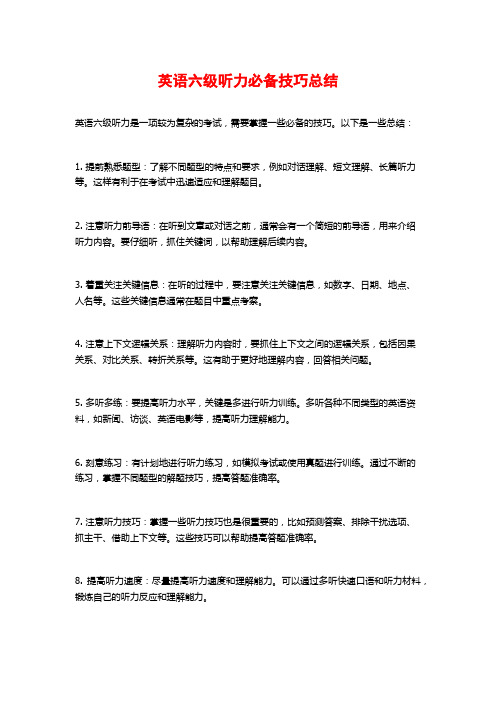
英语六级听力必备技巧总结英语六级听力是一项较为复杂的考试,需要掌握一些必备的技巧。
以下是一些总结:1. 提前熟悉题型:了解不同题型的特点和要求,例如对话理解、短文理解、长篇听力等。
这样有利于在考试中迅速适应和理解题目。
2. 注意听力前导语:在听到文章或对话之前,通常会有一个简短的前导语,用来介绍听力内容。
要仔细听,抓住关键词,以帮助理解后续内容。
3. 着重关注关键信息:在听的过程中,要注意关注关键信息,如数字、日期、地点、人名等。
这些关键信息通常在题目中重点考察。
4. 注意上下文逻辑关系:理解听力内容时,要抓住上下文之间的逻辑关系,包括因果关系、对比关系、转折关系等。
这有助于更好地理解内容,回答相关问题。
5. 多听多练:要提高听力水平,关键是多进行听力训练。
多听各种不同类型的英语资料,如新闻、访谈、英语电影等,提高听力理解能力。
6. 刻意练习:有计划地进行听力练习,如模拟考试或使用真题进行训练。
通过不断的练习,掌握不同题型的解题技巧,提高答题准确率。
7. 注意听力技巧:掌握一些听力技巧也是很重要的,比如预测答案、排除干扰选项、抓主干、借助上下文等。
这些技巧可以帮助提高答题准确率。
8. 提高听力速度:尽量提高听力速度和理解能力。
可以通过多听快速口语和听力材料,锻炼自己的听力反应和理解能力。
9. 养成记笔记的习惯:在听力时,可以适当记笔记,帮助理解听力内容。
记下关键信息、人物关系等,有助于回答问题。
10. 正确把握时间:英语六级听力部分时间紧张,需要在规定时间内完成题目。
因此,要掌握好时间分配,避免在某道题上花费过多时间导致其他题目未完成。
希望这些技巧能对你的英语六级听力备考有所帮助!。
英语听力考试四大答题技巧

英语听力考试四大答题技巧1 短对话(Short Dialogue)的答题技巧这部分试题一共有8 道试题,对话一般是有两个不同的说话者(two speakers)进行问答或者交流,然后由第三个说话者针对对话内容进行提问,提问形式一般是特殊疑问句的形式,问题主要涉及到对话的主题、人物关系、时间、地点、情节等,英语学习者要注意听懂双方对话中话语的隐含意义。
在大学英语六级考试听力的考试过程中,英语学习者可以根据自己在听的时候的理解以及听之前的预测迅速地在题目的A,B,C,D 选项后面做一些自己明白的记号,比如在认为有可能成为答案的选项后面或者根本没有可能成为答案的选项后面分别做不同的记号,这样当听到问题的时候就可以很确定地选择答案2 长对话(Long Conversation)的答题技巧这部分试题一共有7道试题,两个长对话,和短对话一样,长对话的答案一般也是从上面短对话的几个方面去考虑得出答案。
要注意的是,有时候同一个长对话里的不同问题,答案可能从不同的方面得出。
做这部分试题的时候,要注意以下几点:听音前,尽可能地把3 或者4道试题的选项浏览一遍,根据选项猜测可能出现的问题及提问方式。
听音时,迅速抓住与选项及所猜测问题有关的关键词,速记有关内容或者在选项后面做记号,在有可能成为答案的选项后面做记号,在绝对没有可能成为答案的选项后面做记号,当然两种记号肯定应该不一样。
听清问题,修正猜测问题,做出正确选择。
另外在长对话中,由于问题不止一个,为了防止听了后面,忘了前面,因此在听的.过程中,参照各题的选项,做一些简要的笔记,是很有用的,特别是听到数字、时间、年龄、地点等问题时,简要的笔记尤其有用3 短文听力(Passage Listening)的答题技巧这部分试题一共有10 道试题,有三个短文,每个短文之后可能会有3-4 个问题,短文听力部分的试题除了上面提到的长对话的解题方案外,平时还应加强阅读的训练,同时在考试中运用阅读的一些技巧。
六级听力真题及答案解析
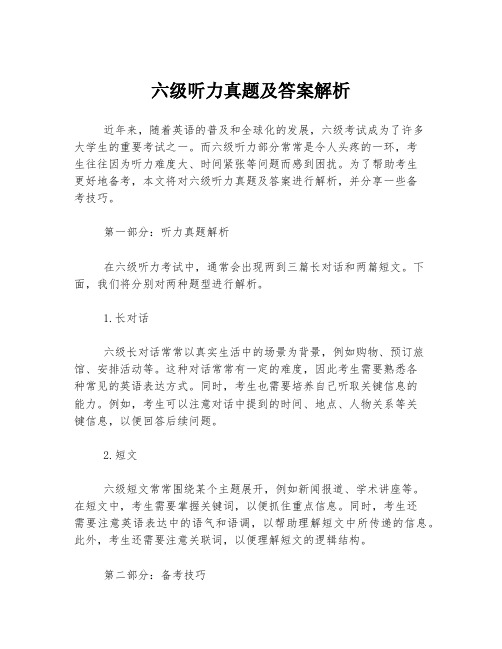
六级听力真题及答案解析近年来,随着英语的普及和全球化的发展,六级考试成为了许多大学生的重要考试之一。
而六级听力部分常常是令人头疼的一环,考生往往因为听力难度大、时间紧张等问题而感到困扰。
为了帮助考生更好地备考,本文将对六级听力真题及答案进行解析,并分享一些备考技巧。
第一部分:听力真题解析在六级听力考试中,通常会出现两到三篇长对话和两篇短文。
下面,我们将分别对两种题型进行解析。
1.长对话六级长对话常常以真实生活中的场景为背景,例如购物、预订旅馆、安排活动等。
这种对话常常有一定的难度,因此考生需要熟悉各种常见的英语表达方式。
同时,考生也需要培养自己听取关键信息的能力。
例如,考生可以注意对话中提到的时间、地点、人物关系等关键信息,以便回答后续问题。
2.短文六级短文常常围绕某个主题展开,例如新闻报道、学术讲座等。
在短文中,考生需要掌握关键词,以便抓住重点信息。
同时,考生还需要注意英语表达中的语气和语调,以帮助理解短文中所传递的信息。
此外,考生还需要注意关联词,以便理解短文的逻辑结构。
第二部分:备考技巧除了熟悉六级听力题型和解题技巧外,考生还应该有一定的备考策略。
下面是一些建议:1.多听英语材料通过多听英语材料,例如英语广播、英语新闻等,可以提高自己的听力水平。
可以选择一些与六级听力相似的材料,熟悉听力考试中常见的场景和词汇。
2.做题时注意时间管理六级听力考试的时间紧张,因此考生需要在备考过程中培养自己的时间管理能力。
可以通过做模拟题或者进行计时练习,提高自己在限定时间内的答题速度。
3.划重点在做听力题时,可以尝试在听力原文上划重点。
通过划分关键信息和主要内容,可以帮助考生更好地进行后续问题的回答。
4.提高词汇量六级听力中常常涉及到一些较为复杂的词汇和表达方式,因此考生需要在备考过程中提高自己的词汇量。
可以通过背单词、扩大阅读范围等方式来积累词汇。
综上所述,六级听力对考生来说是一个具有一定难度的考试环节。
